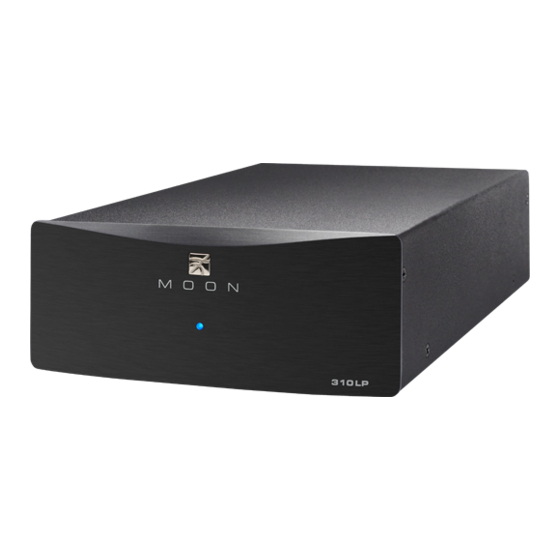
Table of Contents
Advertisement
Quick Links
Advertisement
Table of Contents

Summary of Contents for Simaudio MOON 310LP
- Page 1 Owner’s Manual MOON Series 310 LP Phono Preamplifier...
-
Page 2: Important Safety Instructions
MOON 310LP Phono Preamplifier Important Safety Instructions Read these instructions. Keep these instructions. Heed all warnings. Follow all instructions. Do not use this apparatus near water. Clean only with a dry cloth. Do not block ventilation openings. Install in accordance with the manufacturer’s instructions. Do not install near any heat sources such as radiators, heat registers, stoves or another apparatus that produces heat. - Page 3 European Community Please read all instructions and precautions carefully and completely before operating your Simaudio MOON 310LP Phono Preamplifier. ALWAYS disconnect your entire system from the AC mains before connecting or disconnecting any cables, or when cleaning any component. To completely disconnect this apparatus from the AC mains, disconnect the power suppy cord plug from the AC receptacle.
-
Page 4: Table Of Contents
Circuit Board Layout ......... 7 Internal Settings ..........8 Using the 310LP with an External Power Supply ...11 Rear Panel Connections ........12 Operating the 310LP ........13 Specifications ..........14 www.simaudio.com Simaudio Ltd., 1345 Newton Road Boucherville, Quebec J4B 5H2 CANADA Date Code: 20130306 ____________________________________________________________________________________... -
Page 5: Congratulations
The customized packaging is specially designed to protect the MOON 310LP Phono Preamplifier from potential damage that may occur during shipping. Please write the serial number of your new Simaudio MOON 310LP in the space provided below for future reference. Serial No.: ________________... -
Page 6: Introduction
MOON 310LP Phono Preamplifier Introduction Your MOON 310LP Phono Preamplifier incorporates many significant design features to achieve its “world class” level of performance. This is an abbreviated list of the more important features: Isolated power supply on a separate circuit board using a toroidal transformer with 2 stages of voltage regulation. An extremely short signal path for a faster transient response. -
Page 7: Circuit Board Layout
MOON 310LP Phono Preamplifier Circuit Board Layout Figure 1: MOON 310LP Circuit Board layout Available Settings: A – Resistance loading jumper bank B – Capacitance loading jumper bank C – Equalization curve jumper bank D – Gain level jumper bank ____________________________________________________________________________________ Circuit Board Layout... -
Page 8: Internal Settings
MOON 310LP Phono Preamplifier Internal Settings There are four (4) types of input settings available on the MOON 310LP Phono Preamplifier; Capacitance loading, Resistance loading, Equalization curve and Gain level. Each setting is adjustable through the use of jumpers. For each type of setting, there are 2 banks of jumpers –... - Page 9 MOON 310LP Phono Preamplifier Internal Settings (cont’d) Capacitance Loading: There are three (3) different settings available for setting the capacitive load; 0pF, 100pF and 470pF which are represented by jumper sockets J6, J7 and J8 respectively for the left channel and jumper sockets J24, J25 and J26 for the right channel (refer figure 4 below).
- Page 10 MOON 310LP Phono Preamplifier Internal Settings (cont’d) Gain Setting: There are four (4) gain settings available on the MOON 310LP. They are 40dB for MM cartridges and 54dB, 60dB and 66dB for MC cartridges. However, keep in mind that when using the balanced XLR outputs, each of these gain levels increase by a factor of 6dB to 46dB, 60dB, 66dB and 72dB respectively (note: to keep the circuit board labelling simple, only the single- ended RCA gain levels are indicated).
-
Page 11: Using The 310Lp With An External Power Supply
MOON 310LP Phono Preamplifier Using the 310LP with an External Power Supply The MOON 310LP Phono Preamplifier can be operated with the optional MOON 320S Power Supply (purchased separately). Referring to figure 10 below, you will see an array of four (4) jumper sockets labeled STR1, STR2, STR3 and STR4. -
Page 12: Rear Panel Connections
MOON 310LP Phono Preamplifier Rear Panel Connections Figure 11: MOON 310LP Rear panel The rear panel will look similar to Figure 11 (above). There is one pair of single-ended inputs on RCA connectors located in the center with a ground post directly below. Connect the cables from your turntable to these inputs and the ground lead wire to the ground post. -
Page 13: Operating The 310Lp
MOON 310LP Phono Preamplifier Operating the 310LP We recommend that you leave your MOON 310LP Phono Preamplifier powered up at all times to maintain optimal performance. In the event that you plan to be away from your home for a few days, powering off the Phono Preamplifier may not be a bad idea. -
Page 14: Specifications
MOON 310LP Phono Preamplifier Specifications Circuit Layout ............Mirror-image symmetrical circuit Power Supply Transformer ........10VA Power Supply Capacitance ........14,000µF Single-ended inputs ..........1 pair (RCA) Input Impedance - Adjustable ......... 47, 100, 470, 1k, and 47kΩ Input Capacitance - Adjustable ....... 0, 100, and 470 pF Single-ended output ..........
















Need help?
Do you have a question about the MOON 310LP and is the answer not in the manual?
Questions and answers